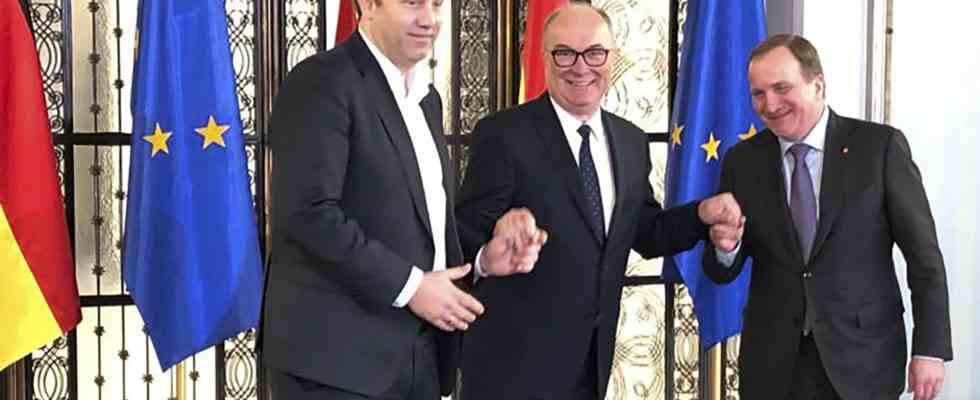Status: 03/09/2023 04:06
SPD leader Klingbeil experienced both skepticism and expectations of Germany on his trip to Eastern Europe. New approaches in the social democratic Ostpolitik should help.
He’s probably been through a lot in the last few days. You could see the hardships that Lars Klingbeil currently means to be on the road in Eastern Europe as an SPD politician. The party leader reported on Wednesday in Warsaw that the two night train journeys through Ukraine and the marathon day in Kiev were tough. The compartment and the bunks were much too small for the six-foot-tall man, so he ended up sleeping on the floor.
The anecdote of the Kiev traveler is perhaps symbolic of the goal of this trip: the SPD wants to address the concerns and wishes of the Eastern European states more than before. A year after admitting massive mistakes in politics towards Russia, the party leader wants to do everything better. Being able to adapt to a difficult environment could be good practice for this.
New eye level in the SPD Ostpolitik
The SPD titled their event in Warsaw’s Polin Museum “Zeitenwende-Konferenz”. Klingbeil wanted to show unity and understanding with all those countries that see themselves particularly exposed to a threat from Russia. Visions for a common policy in the midst of the ongoing international crisis are to be developed with the chairmen of social-democratic parties from Eastern and Northern Europe. This applies first and foremost to the European security architecture.
The SPD leader is always looking for a level playing field with neighboring countries. When he heard last year from the Lithuanian deputy leader of the local Social Democrats that Lithuanians were afraid of a Russian attack, he was about to reply: “Nonsense, Putin would never do something like that.” In the meantime, it has become clear to him that precisely this reflex in dealing with Russia’s neighbors is wrong.
“During my inaugural visits as party chairman last year, I experienced how critical German politics is viewed in Eastern Europe,” Klingbeil recalled. So that this does not turn into a latent anti-Germany course, more connections to the partners are urgently needed. “I don’t gain trust by giving a clever speech, but by being in permanent dialogue,” said Klingbeil.
Expert: It’s the younger ones that count
One key seems to be the development that the SPD has made on questions of defense policy: “This approach by the SPD leader is very strong and supports Ukraine,” praised the leader of the Polish Social Democrats, Wlodzimiercz Czarzasty. “Today we see a correct assessment of Russia and a correct assessment of the threats to European security posed by Russia.” The change in policy, which many in the SPD still perceive as painful, seems to be paying off.
“It was a long and by no means easy journey for the SPD and its leaders,” says Thorsten Faas, a party researcher at Freie Universität Berlin. Many of the people involved would have stood for the close relationship with Russia. “Especially younger people in the party like Lars Klingbeil have a special role because the personal connections to the old line are less present.”
It doesn’t work without Brandt
But Klingbeil doesn’t want to get rid of all the symbols of Ostpolitik – it’s no coincidence that he chose Warsaw for his initiative. On the morning before the conference, he stood with a red and a white carnation in his hand, together with social democrats from 13 European countries, at the place where his eternal predecessor became the symbol of the policy of reconciliation with Poland.
Willy Brandt and his kneeling in front of the memorial for the 1970 Warsaw Ghetto Uprising will not and cannot be surpassed by Klingbeil. But he wants to continue. “Even if the situation is completely different today, we as the SPD must do everything we can to defend the motives behind the détente and Ostpolitik of the time,” said Klingbeil. He finds a lot of determination and daring in Brandt and his successor Helmut Schmidt, which could help again today.
“No one will question the successes of the Ostpolitik at the time,” agrees FU researcher Faas. “It is and will remain a central anchor point for many in the SPD.”
Polish party colleague has a wish for Brussels
Whether the governing SPD party can count on the support of the Polish Social Democrats in the future will not be decided until the Polish elections in autumn. Because Poland has so far been governed by a right-wing alliance that repeatedly strikes a chord that is critical of Germany and Europe. “I believe that German politics is going in the right direction,” praised Klingbeil’s Polish colleague Czarzasty at the end. “And I don’t check whether this attitude is popular in Poland or not.”
He gave the SPD leader another key to the heart of the Poles: “Europe should help a lot more with the care of Ukrainian refugees. The EU Commission should provide us with the same money for this as they did in the case of the Turkey has done,” demanded Czarzasty. This is the only way to prevent a further shift to the right in the elections.

